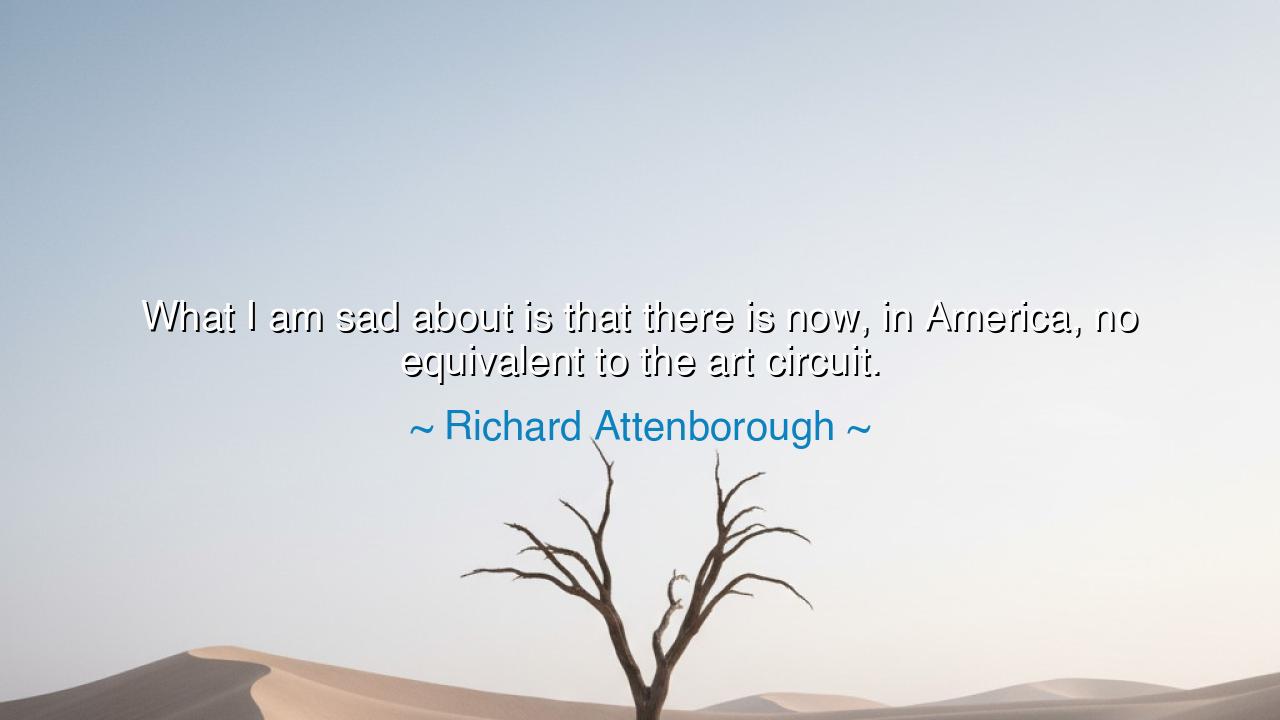
What I am sad about is that there is now, in America, no
What I am sad about is that there is now, in America, no equivalent to the art circuit.






Hearken, O children of the ages yet unborn, and consider the words of Richard Attenborough, who spoke with lamentation: “What I am sad about is that there is now, in America, no equivalent to the art circuit.” In these words lies a meditation upon the fleeting nature of culture, the slow erosion of communal spaces of creation, and the sorrow of one who beholds the decline of traditions that once nurtured the soul of a people. Attenborough mourns not for himself, but for a civilization losing its vital connection to art, dialogue, and the celebration of creativity.
Consider the meaning: the art circuit, as it thrived in Europe for centuries, was more than galleries and exhibitions—it was a living network, a web of artists, patrons, critics, and audiences, where creation met appreciation, and talent found recognition and growth. It was the marketplace of ideas, the sacred agora where beauty, thought, and craft intertwined. Its absence in America, as Attenborough observes, signals a fracture between the artist and society, a loss of spaces where the human spirit may flourish and converse across generations.
History provides examples of such vibrant circuits. In Renaissance Florence, the Medici family fostered a network of painters, sculptors, and thinkers, cultivating the flowering of human potential. Michelangelo, Leonardo da Vinci, and Botticelli were not isolated figures—they thrived in an ecosystem of support, patronage, and critique, where their work could be seen, challenged, and celebrated. In such a world, art was not merely an object but a living force, shaping society’s conscience and delighting the senses.
Attenborough’s lament is also a reflection upon the modern condition: in the vast landscapes of America, despite wealth and opportunity, the infrastructure for art to circulate and dialogue—the salons, galleries, and intimate networks that nurture innovation—has been weakened or dispersed. Talent exists, yet without connection and communal engagement, the spark of genius struggles to ignite. In this, there is a lesson that echoes through all ages: the fruits of human creativity require not only individual skill but also the nurturing embrace of community.
Yet from sorrow arises guidance. Even in absence, one may seek to rebuild the circuit, to forge networks where ideas meet and flourish, to cultivate spaces where artists and audiences can converge. The example of modern collectives—artist-run galleries, online forums, collaborative studios—demonstrates that the spirit of the circuit can endure, if one pursues it with dedication, vision, and courage. Herein lies the heroic act: to restore connection, dialogue, and celebration of creativity where it has been lost.
Attenborough’s observation also reminds us that the health of a society is measured not merely in wealth or power, but in its commitment to art, culture, and the nourishment of imagination. Nations that neglect the arts risk becoming barren in spirit, their citizens impoverished in empathy, reflection, and wonder. It is a call to action: support artists, engage with creativity, and recognize that art is not luxury, but lifeblood of civilization.
From this, let us draw a lesson: cultivate and protect spaces where art and dialogue may thrive. Attend galleries, support performance, mentor emerging talent, and create communities where beauty, critique, and innovation may flourish. The absence of such a circuit, as Attenborough mourns, need not be permanent; the hands of those who care can rebuild it, thread by thread, heart by heart.
Finally, carry forward his wisdom into your own life: do not be passive in the face of cultural decline. Seek the living pulse of creativity, nurture it in yourself and others, and recognize that the legacy of art depends upon the vigilance and devotion of every generation. In doing so, you honor not only the artists of yesterday but the possibility of a society rich in imagination, empathy, and the enduring power of the human spirit.






AAdministratorAdministrator
Welcome, honored guests. Please leave a comment, we will respond soon